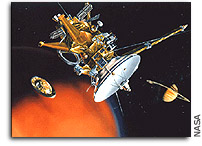NASA Cassini Significant Events for 09/19/07 – 09/25/07

The most recent spacecraft telemetry was acquired on Tuesday, September 25, from the Madrid tracking complex. The Cassini spacecraft is in an excellent state of health and all subsystems are operating normally. Information on the present position and speed of the Cassini spacecraft may be found on the “Present Position” web page located at http://saturn.jpl.nasa.gov/operations/present-position.cfm.
Wednesday, September 19 (DOY 262):
The Cassini Mission Assurance Manager hosted part one of an internal Cassini Risk Review today. Long before a spacecraft leaves the ground project management tracks what possible risks are associated with all aspects of the spacecraft, instruments, and operations, as well as what mitigation can be put in place to minimize the risk. Periodically the list is reviewed to determine what can be retired, if there are any new risks to be added, or if the mitigation can be augmented.
Today sequence leads began the uplink of Instrument Expanded Block files for S34. The background sequence will go up on Thursday, and the sequence will begin execution on Saturday.
Navigation has released an update to the Cassini reference trajectory. The purpose of the update is to raise the Enceladus 3 and 4 flyby altitudes from 25 km to 50 km. The new trajectory 070918 supercedes all previous Cassini reference trajectories and covers the period from 18-SEP_2007 to 10-JUL-2010.
An image of the surface of Iapetus is Astronomy Picture of the Day today. Go to: http://antwrp.gsfc.nasa.gov/apod/ap070919.html
Thursday, September 20 (DOY 263.):
Cassini participated in the “Education Alley” portion of the American Institute of Aeronautics and Astronautics (AIAA) conference in Long Beach California from Sept. 18-20. School children from throughout Southern California visited the event and saw 3D images from space, had a chance to have questions answered from space scientists, and collected mission materials. Educators learned about JPL’s education programs including Reading, Writing, and Rings.
Friday, September 21 (DOY 264):
The Aftermarket Process for the S39 sequence, orbits 62-65 began today. The first step in the process is the submission of all proposed changes that require re-integration of the segments contained in the S39 sequence. Once these have been collected, they will be assessed and a determination will be made if they fit within available resources. The process lasts approximately 5 weeks and will conclude on Oct. 31.
Cassini supported the Graduate Aeronautical Laboratories at Caltech (GALCIT) “50 Years in Space: An International Aerospace Conference Celebrating 50 Years of Space Technology” from Sept. 19-21. Cassini Outreach, Science and Mission Planning members were on hand long with the quarter scale Cassini, and full size Huygens probe models. 200 students from Pasadena’s Polytecnic School and over 100 conference attendees stopped by the display.
Saturday, September 22 (DOY 265)
The S33 sequence concluded and S34 began execution today at 2007-265T20:51. The sequence will run for a total of 39 days and conclude on Oct. 31, 2007. During that time there will be one targeted encounter of Titan and two Orbit Trim Maneuvers numbered 130 and 131. These events will occur in S34A. As was mentioned last week, S34 is split into four parts, A, the CDS flight software load and checkout, Hyperion mini-sequence, and part B. Seven non-targeted encounters will be spread throughout the sequence, one each of Dione, Enceladus, Telesto, Hyperion, Titan, Helen, and Prometheus. Science at the start of the sequence begins with a cross-discipline segment and ongoing Magnetospheric and Plasma Science campaign.
Monday, September 24 (DOY 267)
The Spacecraft Operations Office will begin uplink to the SSR of the Command Data Subsystem (CDS) version 10 flight software today. There are three uplink windows allocated for this activity, which will conclude over the pass on Wednesday. Beginning Sunday, Oct. 7, the team will load the CDS units, swap strings, and perform pattern tests and other checkout activities. During this time there will be no science activity. Seven of the instruments will be placed in sleep mode, and two will be on with no science data output. RADAR, Radio Science, and the Cosmic Dust Analyzer are not changing state for this period. The Hyperion mini-sequence is scheduled for uplink on the 16th with execution to start on the 18th. All instruments will be turned back on at the start of the mini-sequence.
An encounter strategy meeting was held today to cover the period between Oct. 2 through Nov. 19, Titan flybys T36 and T37, and maneuvers 131-133.
Tuesday, September 25 (DOY 268)
A Cassini-Huygens Analysis and Results of the Mission teleconference was held today. The topic: Reaching for Titan & the Rings with Cassini Radio Science.
Due to the rescheduling of the DAWN launch due to weather, Cassini will be uplinking commands to the spacecraft to accommodate the loss of DSS-25 coverage on DOY 270.
Wrap up:
Check out the Cassini web site at http://saturn.jpl.nasa.gov for the latest press releases and images.
The Cassini-Huygens mission is a cooperative project of NASA, the European Space Agency and the Italian Space Agency. The Jet Propulsion Laboratory, a division of the California Institute of Technology in Pasadena, manages the Cassini-Huygens mission for NASA’s Science Mission Directorate, Washington, D.C. JPL designed, developed and assembled the Cassini orbiter.









